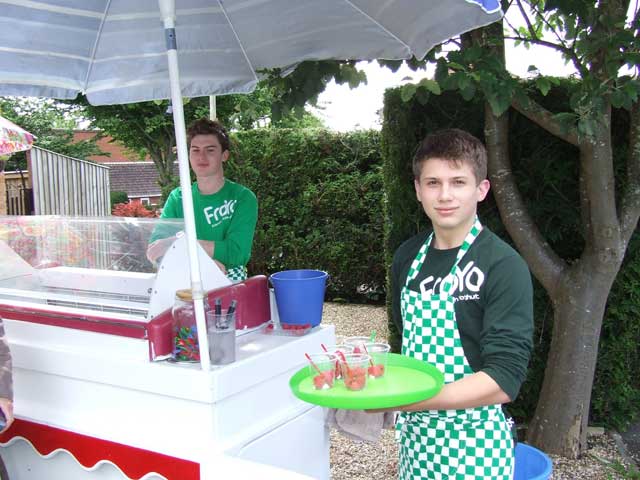Take a lesson from the entrepreneurs who simply couldn't wait to graduate
Undergraduates are getting a head start on their careers by launching their own enterprises while they study

Chris Hannaway, 20, was so unimpressed by the frozen yoghurt on sale in the shops that three years ago he and his friend Will Hammersley decided to see if they could do better themselves. The two students at Bath University created their own flavours in the university kitchen, rented a freezer, procured a Victorian ice cream cart and took their new product out into the streets of Bath.
It was an instant hit. The denizens of Bath lapped up the pair's favourite strawberry and raspberry flavour. "Because people liked the product so much we realised we needed to keep on making it," says Hannaway.
But making frozen yoghurt takes time, particularly when your technology is basic and there are only two of you, so the dynamic duo decided to find a manufacturer. They went back to the drawing board, changed the name of the company to Arctic Farm and eventually found Beechdean Dairies in High Wycombe to create their product.
Their first retail customer was Harrods in July 2009. Now, almost a year later, they are selling in 110 Sainsbury's stores around the country. "We are taking a leaf out of Ben & Jerry, but we are more health oriented," says Hannaway. "It's not a weight-watcher's dessert but it's not full of sugar and fat either. It's guilt free."
The experience of these two friends, who are still at Bath University, is part of a trend. Entrepreneurship is bursting out all over in British universities. Not content with waiting until they graduate, today's students are establishing their own companies while they study for their degrees, hoping to set themselves up with profitable and rewarding careers.
Driven by ambition and the desire to strike out on their own, the undergraduates of the 21st century are a breed apart from their parents' generation. The idea of joining a large company – of being a small cog in a large machine – does not appeal nearly as much as creating their own business their own way.
Hannaway, who is a student of management, says that it has been tough combining the degree with a new start-up business. "I did a six-month internship with M&S as part of my degree, and it was hard running the business as well," he says. "But normally at university we only had 10 hours of lectures a week, so you had plenty of time to do something else."
Learning how to start up your own company while also studying at university is a good time to do it, he thinks, because it is a safe environment in which to experience knockback and failure. "I can afford to fail here because it doesn't affect my ability to earn a living," he says.
Student-run companies such as Arctic Farm are being supported by the National Consortium of University Entrepreneurs, a grass-roots organisation that represents local student enterprise societies and lays on boot camps for students to give them the skills they need and special sessions in how to lay their hands on finance. It was founded by 12 university enterprise society leaders in December 2008 and today has more than 65. Its membership has grown to 35,000 since then, and it is now looking to expand its reach abroad to students as far apart as Sweden and Ethiopia.
"The fact that students are out there networking and taking risks is really important," says Victoria Lennox, the consortium's founder and CEO. "Things are beginning to happen. Silicon Valley grew out of the ecosystem that formed around Stanford University in California. We're seeing the same thing happening now around Cambridge, UCL and Edinburgh."
All this effort has been given the official seal of approval. The Higher Education Funding Council for England (Hefce) has awarded £40,000 to the consortium to enable it to increase its support to enterprising students, partly because Hefce wants students to look at alternative career routes in the recession. It also believes that student entrepreneurs can play a part in stimulating future economic growth.
Stephen Leguillon, a recent graduate of Warwick University, is another budding tycoon. He set up a company, E-resistible, with two other students in May 2008. All three were studying for a Bachelors degree in management at Warwick Business School and looking for a business opportunity.
"When I got to Warwick I realised I couldn't get a takeaway meal because the campus was so remote. The answer was a one-stop location where you could order food and ready meals. I hit on the idea of a website."
The rest is history. At first, 16 restaurants signed up; now there are 450 covering more than 30 towns and cities and the company hopes to expand further. Customers can pay by credit card or cash on delivery. Most importantly, the business is now profitable.
Other students want to do good as well as be entrepreneurial, such as Edwin Broni-Mensah, a maths PhD student at Manchester University. He established GiveMeTap, an enterprise that has created a network of cafes that give free tap water to people who carry a reusable aluminium bottle, which students buy for £7. Turnover this year is £8,000, of which 70 per cent goes to water charities around the world. "When I began my PhD, my aim was to go into investment banking," says Broni-Mensah. "Now I want to join a start-up company – I've got the entrepreneurial bug."
Join our commenting forum
Join thought-provoking conversations, follow other Independent readers and see their replies
Comments
Bookmark popover
Removed from bookmarks